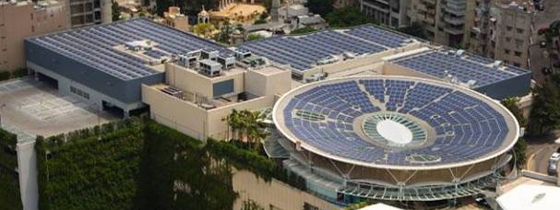ABC, the Lebanese retail pioneer, launched an unprecedented sustainable eco-friendly project in Lebanon that employs photovoltaic energy to generate electricity. The launch drew a prominent crowd of politicians, environmental NGOs, universities, and press who were eager to learn more about the large scale project that occupies 4000 m2, spread over ABC Achrafieh's landmark dome and flat surfaces above the food court and cinema space.
ABC's CEO, Mr. Robert Fadel, dwelled on the importance of the project, "Today, we are gathered in ABC Achrafieh to announce the completion of the photovoltaic project, one of the biggest green initiatives undertaken by a Lebanese corporation. This project is a first step towards realizing our goal of applying the highest standards of green design on all ABC edifices."
Fadel explained that this pioneering project also serves to raise environmental awareness and to support the environment, which is a top priority to ABC.
ABC's Technical Expert explained how the project works to provide a capacity of 0.45 MW that is enough to feed up to 500 houses and to power ABC department store and how ABC is expected to benefit from a payback period of less than 5 years and free renewable energy up to 20 years after that from the project.
Media figure, Paula Yacoubian, talked about the positive environmental impact of the project and the importance of fostering an environmentalist culture among Lebanese citizens through shedding light on successful projects of the sort and their environmental and economic significance. Yacoubian pointed out that ABC's Photovoltaic project should serve as an example for those looking to develop eco-friendly solutions in their own fields of work.
The Photovoltaic project is part of ABC's comprehensive plan to provide solutions to social, humanitarian, and environmental issues that affect the local community, who is at the center of ABC's Corporate Social Responsibility strategy and vision.
In the same context, ABC held several eco-friendly activities in tandem with the launch, such as an eco-educational exhibition in collaboration with TerreLiban and the participation of students who prepared a buffet using solar energy. Engineering students from AUB and AUST held an exhibition of their alternative energy projects, highlighting their economic and scientific value.
What is a photovoltaic system?
A photovoltaic system (photo means light and voltaic means voltage), uses photovoltaic (solar) cells to directly convert the energy of light into electricity. This system is mainly used to reduce the need for electricity and replace the traditional polluting power generation options. While the initial cost of setting up such a system may prove to be high, even though it’s been decreasing year after year, “the operational costs associated with the conventional fuel mix (coal, oil, nuclear, natural gas) used for generating electricity are not substantially less than the “full” costs associated with photovoltaic systems and, in many cases, exceed the costs of PVs”. More importantly, there are hidden costs to using conventional energy sources such as damaging the environment and increasing pollution that are crucial and need to be taken into consideration.
That’s why more and more companies and corporations worldwide are investing in renewable energies as such solutions will pay off on the long run financially and environmentally. Speaking of smart eco-friendly solutions in Lebanon, The Beirut River Solar Snake is a similar project to ABC’s plant and consists of a photovoltaic farm set on top of Beirut’s river and aimed at generating 1.08 MWp to light up around 1000 houses.
in renewable energies as such solutions will pay off on the long run financially and environmentally. Speaking of smart eco-friendly solutions in Lebanon, The Beirut River Solar Snake is a similar project to ABC’s plant and consists of a photovoltaic farm set on top of Beirut’s river and aimed at generating 1.08 MWp to light up around 1000 houses.
Ifpinfo
17 June
























































